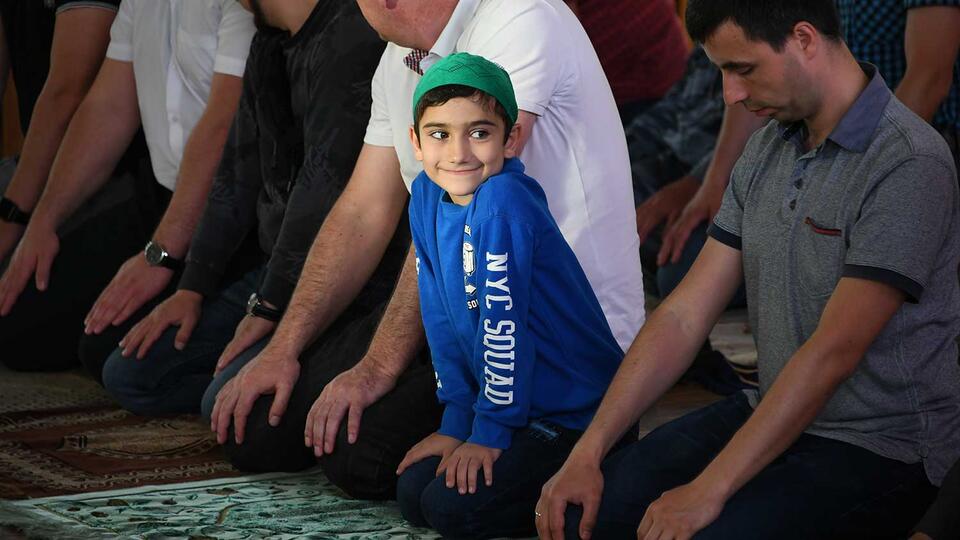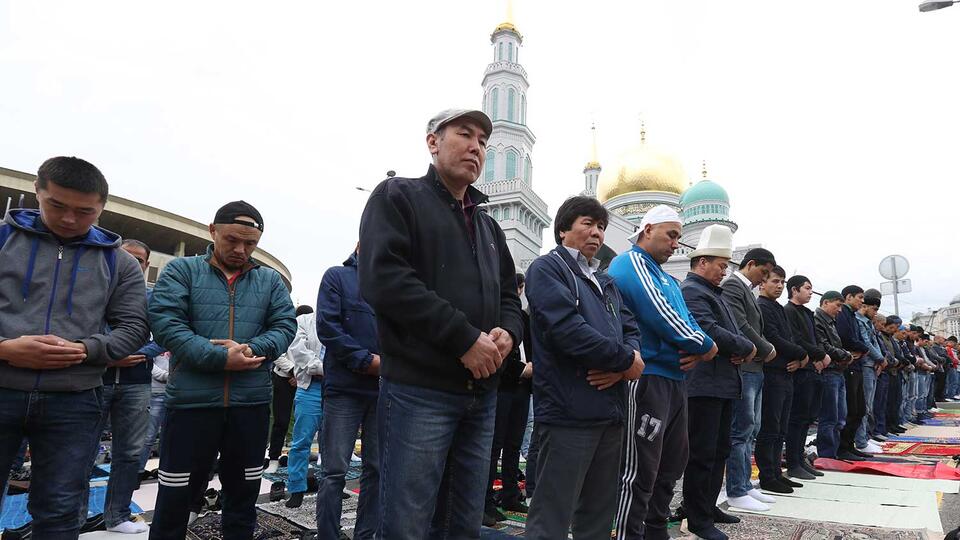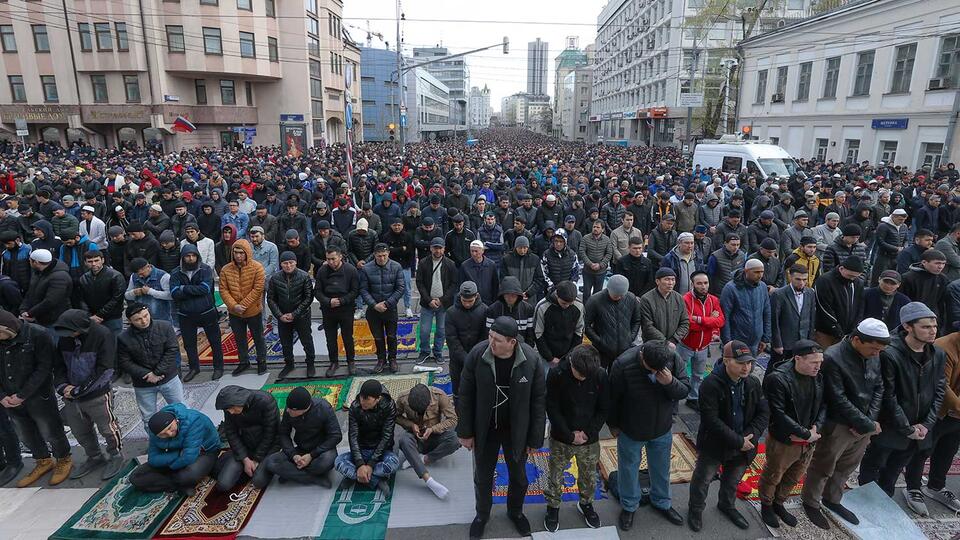Photo: © TASS/Artem Geodakyan

Photo: © TASS/Artem Geodakyan
Eid al-Fitr, or the Feast of Conversation, is a special day for Muslims. It is preceded by a complex and lengthy fast, which begins on the first day of the new moon of the holy month of Ramadan (or Ramadan). According to legend, it was during this month that Mecca was conquered by Muhammad and the Koran was revealed to Muslims.
Eid al-Fitr is the Turkic name for one of the two main Islamic holidays, in Arabic it is called Eid al-Fitr. For thirty days, Muslims observed strict rules: believers refused to eat and drink during daylight hours. But with the onset of the holiday, all prohibitions are lifted.
About the traditions of this day, which developed many centuries ago, – in the material REN TV.
When will Eid al-Fitr come in 2023
Uraza Bairam does not have a clear date. From year to year, the date and month of the celebration of the end of Ramadan is determined by the lunar calendar by the local Spiritual Administration. The exact time of the onset of Eid al-Fitr varies due to the geographical location and time zone of the country. In 2023, the Feast of Conversation is celebrated on April 21, and to be more precise, it begins at sunset on the night of April 21 – the first day of the new moon.

The first day of the month of Shawwal is traditionally considered festive. In Muslim countries, this is a public holiday. Usually, the next two or three days are also declared non-working.
In Russia, the local authorities of several republics and regions with a large number of ethnic Muslims in the population independently determine whether to declare this day a non-working day. So, April 21, 2023 was declared a day off in Tatarstan, Bashkiria, Chechnya, Dagestan, Ingushetia, Karachay-Cherkessia, Kabardino-Balkaria, Adygea and Crimea.
History of Eid al-Fitr
The tradition of celebrating Uraza Bayram has existed since the time of the Prophet Muhammad and the birth of Islam – since 624. It is known that Eid al-Fitr was celebrated many centuries ago in the Arab Caliphate, the Ottoman Empire, Egypt, North Africa, Afghanistan, Pakistan and other states. The holiday of breaking the fast is equally important for both Sunni Muslims and Shiite Muslims.
Eid al-Adha is considered the second most important holiday in Islam after Eid al-Adha. Its name can be translated from Arabic (Eid al-Fitr) as “the holiday of breaking the fast” and from the Turkic languages (Eid al-Fitr) as “the holiday after the fast.”
How to prepare for Eid al-Fitr
On the eve of Eid al-Fitr, Muslims clean the house and prepare traditional dishes.

Before performing the holiday prayer, it is necessary to distribute the obligatory “alms of breaking the fast” – zakat al-fitr. Each person should help low-income families with money or food. It is advisable to do a good deed before the holiday prayer, that is, before the official onset of the holiday.
Zakat al-fitr is done in order to atone for possible sins and mistakes made during Ramadan, as well as to help those in need.
Before the holiday, the followers of Islam make a full bath with incense and put on smart clothes.
Traditions of Eid al-Fitr
There are many traditions around Eid al-Fitr. So, believers congratulate each other with the famous expression “Eid Mubarak!”, which means “I wish you a blessed holiday!”.
In the evening on the eve of Eid al-Fitr, believers perform namaz at home – it is believed that prayer on this night will certainly be heard. And in the morning at dawn in the mosques begins Gaet-Namaz (or Eid-Namaz, a collective holiday prayer), which gathers thousands of Muslims. Mostly only men are present at the prayer, women are more likely to watch the online broadcast at home.

After a solemn sermon, Muslims return home for a festive dinner. The hostesses prepare various dishes in advance for a large number of guests, since it is customary to invite relatives, friends and neighbors to Eid al-Adha. The conversation takes place in a wide circle.
In some countries, on Eid al-Fitr, there is a tradition similar to caroling: children go around the house in the morning and ask for sweets. Therefore, each hostess specially buys sweets and pastries for her little guests.
It is also a common tradition to go to the cemetery after morning prayers. Men visit the graves of their ancestors, read the Koran and pray for the deceased relatives.
How the table is laid on Eid al-Adha
By tradition, the table should be plentiful, and fasting on the Feast of Breaking the Fast is not allowed. In addition to the ritual beshbarmak, the main dish of oriental cuisine, manti, pilaf and sujuk are served, belyashi and echpochmaks are baked, and sweets are displayed.

Be sure to have dried fruits on the table – figs, dates and sweet raisins. All meals are prepared the day before. From drinks tea, juices and fruit drinks are offered, alcohol remains banned all year round.
What is given for the holiday of Eid al-Fitr
On the Feast of Conversation, Muslims traditionally often go to visit and give gifts. They can be both religious items (Quran, rosary, skullcap), and household items – tea sets, oriental sweets or home decor items.
Children receive the most gifts and sweets on Eid al-Fitr.
What can and cannot be done on Eid al-Fitr
After completing the fast in Ramadan, it is allowed:
- eat and drink at any time of the day;
- smoking cigarettes or using snuff (but it is worth remembering that religion calls for taking care of your health, and it is advisable to avoid these actions);
- play wedding.
On the holiday of Eid al-Adha, it is forbidden:
- do household chores – clean, wash, and so on;
- work, including in the field;
- quarreling with relatives and friends – it is important to remember that swearing during Eid al-Fitr is condemned in Islam.
Source: Ren
Alfred Hart is an accomplished journalist known for his expert analysis and commentary on global affairs. He currently works as a writer at 24 news breaker, where he provides readers with in-depth coverage of the most pressing issues affecting the world today. With a keen insight and a deep understanding of international politics and economics, Alfred’s writing is a must-read for anyone seeking a deeper understanding of the world we live in.
